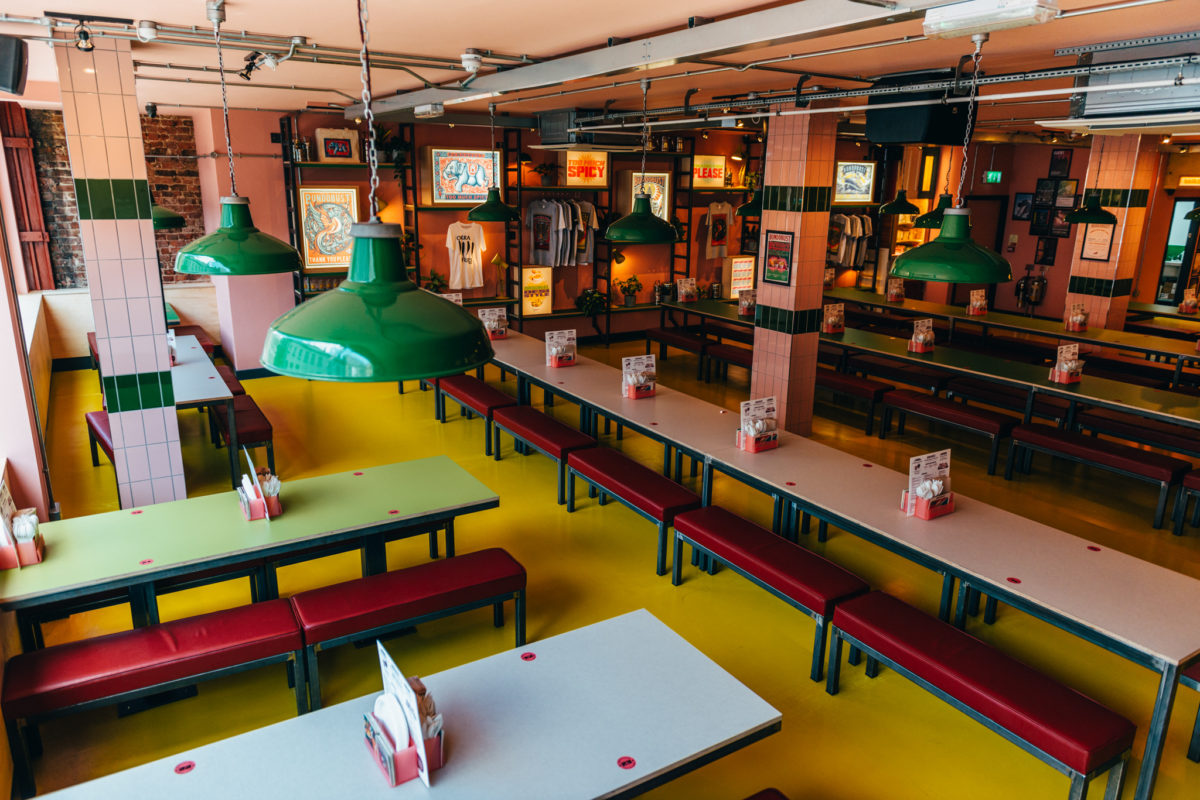January 27, 2021
Big Chat: Trends for the Food & Drink Industry for 2021


2020 has been apocalyptic, to say the least – and we’re not clear of it yet, by a longshot. It’s been painful for everyone. But the food and drink industry, small indies in particular, have really faced the impossible – a legally closed dining scene.
The industry has been shaken to its core, and the fundamentals we all relied on have been rewritten. But what’s in store for the Hospitality and Food & Drink sectors, as we (hopefully) move away from the pandemic and towards some kind of ‘new normal’ in 2021?
We decided to catch up with old friend and food industry insider Thom Hetherington, for his expert take on the lay of the land.
Thom is best known as one of the founders of the PPA award-winning Restaurant magazine and the (renowned far-and-wide) 50 Best Restaurants in the World awards, but he is also CEO of Holden Media, founder of a portfolio of Northern events (such as the Northern Restaurant and Bar exhibition, the NRB Top 50 awards, NRB Debate and NRB Future), and is a speaker, writer, and consultant on food, drink, art and culture in the North.
We got down to the nitty gritty in a Q&A with Thom, chatting about the industry, and looking at some rays of hope amidst the rubble.
Phoebe: We’re still in lockdown, AKA Tier 5 (/the apocalypse) in the first quarter of 2021. When do you expect (or hope) that the food & drink/hospitality industries will fully reopen for business? Do we expect a sudden ‘back to normal’ or a slow process as restrictions are lifted?
Thom: The government (and even some of their most strident critics) seems optimistic about their vaccination targets; vaccinating the four most vulnerable groups (covering 88% of potential Covid deaths) by mid-February. There has been talk of doing all nine vulnerable groups by late March.
By that point, a demographic representing 99% of those likely to die from Covid would have been vaccinated. As we’re seeing, that expectation is already creating a noisy and emotive discussion regarding when, and how fast, to ‘unlock’, with projections ranging from April to – God forbid – Autumn!
Regardless of timing, we should expect a return to tiering rather than a binary switch, though this could be national rather than regional. Hopefully this time there will be more transparency and consistency regarding the mechanisms and metrics as to how we move between tiers. I just hope that those in power manage to balance both the devastating impact of the pandemic itself and the huge benefits, in terms of health and livelihoods, of getting “back to normal”.
In terms of the people’s appetites to stream back into restaurants, bars and pubs, live events, and cultural venues – and to travel (if only domestically) – I think it will be absolutely off the scale.
I understand concerns about a struggling economy throughout 2021, and I appreciate many people will have residual concerns about safety, but I think that our animal spirits and our thirst for normality will prevail.
We saw, over summer, that as and when people could indulge in these social pleasures, the demand was huge. Some venues saw numbers on a par with traditional Christmas numbers, week after week. I have been consistently wrong-footed in my Pollyanna-ish predictions regarding Coronavirus (exacerbated by our woeful policy responses to date!), but May/June should see hospitality firmly back in the groove.
 Chow Down arrived in Leeds, COVID Safe
Chow Down arrived in Leeds, COVID Safe
Phoebe: Do you expect the hospitality industry to make it back to profit in 2021? If not – how long could a recovery take?
Thom: It’s a complicated question, which in many ways my accountant could field better than me. The simple answer has three parts:
First, I expect government support to taper off as restrictions ease through March-June, but if we fight our corner hard, with support from UK Hospitality and local political and industry leaders, this should hopefully keep most operators in an (admittedly financially painful) holding pattern.
Once the industry is fully (or almost fully) open, in May/June, I think demand will be huge. Operating profits should be there for those operators still standing, as they will be lean businesses, having shed any underperforming sites or brands, and will be able to gradually bring staff back into those that are trading well as numbers pick up. Weekly P&Ls could look pretty rosy for all concerned.
Second. The underlying balance sheets will make grim reading. Most operators will be saddled with significant financial battle scars from surviving the previous twelve months, having taken on both government and bank debt in the form of Bouncebacks and CBILs, for which repayments will then be due. Equally, many small business owners will have taken on additional personal debt to protect their businesses, meaning personal loans and borrowings, credit card debt or remortgages.
That is a crushing weight to deal with, eating up their mental and emotional energy when they have a business to re-energise; I don’t feel this point gets acknowledged enough. Operators need help and support as individuals, as parents or partners, not just as business-owners. I think charities like Hospitality Action will be horribly busy throughout 2021.
“Many small business owners will have taken on additional personal debt to protect their businesses, meaning personal loans and borrowings, credit card debt or remortgages. That is a crushing weight to deal with, eating up their mental and emotional energy when they have a business to re-energise, and I don’t feel this point gets acknowledged enough. Operators need help and support as individuals, as parents or partners, not just as business-owners. ”Thom Hetherington
The third and final ‘elephant in the room’ is property debt – though every operator will have a different experience of this. Most will simply not have paid rent for the last nine months, but at some point there needs to be a sensible conversation between landlord and tenant, as to if, how, and when this debt can ever be repaid.
Many landlords have been fair and reasonable so far, but there are plenty of horror stories of tenants being on the verge of eviction if moratoria lapse in Spring. Quite simply, I think the vast majority of operators are focused only on surviving and reopening so they are able to pay their ongoing rent, and cannot fathom how they would ever repay a debt for a period when they legally could not trade. But equally, most landlords have their own financial pressures, whether as private individuals or institutions and pension funds, so a mutual solution has to be found. And could we be at the cusp of a new dawn of turnover-based rents? Paradigms have to change.
My fear is that the economic carnage typical to every recession will repeat itself post-Covid. Early on in a downturn many companies fall over, but most of those will have already had significant underlying issues. The rest batten down the hatches and see it through the storm, but emerge weakened and weighed down by financial debt. This leads to a second flurry of businesses falling over at the cruellest of times – just as we emerge blinking into the beginnings of a recovery. If the government can do anything at this point, it is to focus on supporting businesses through this final sprint over the line. It would save so much pain, and in the medium- to long-term it would be cheaper for the economy and better for jobs. In a perfect world, as a blunt tool, I’d like to see governments do this by retrospectively converting some or all of the government debt, like bouncebacks, into non-repayable grants. It would be messy and imperfect, but would probably be cheaper than trying to recover them all!
Phoebe: What might we have lost?
Thom: It’s an interesting question, and one I want to be optimistic about, without seeming flippant or undermining the terrible pain operators are enduring. The fact is that, thus far, business failures, particularly in terms of local and regional indies, have been much lower than some commentators feared.
It’s important to note, though, that that is by no means a universal positive. Survival (to date) has caused huge suffering, and has often involved significant and under-reported personal debt, not to mention the resultant mental and emotional impact on people and their relationships. It has also still involved distressing levels of redundancy for hospitality workers.
We’ve seen a lot of the casual dining chains use this as an opportunity to restructure, or to shed sites, but I genuinely hope that most of our indies, particularly the embattled pubs and bars and clubs, will grit their teeth and somehow find a way to make it through this final furlong.
On the flipside, I would say (anecdotally) that everyone I have spoken to who was planning to launch in 2020 is still planning to launch in the next three to six months. It’s much easier to put a launch on hold than to pause an up-and-running business, and no one’s appetite seems dimmed, they’re just biding their time.
The Sunday Times reports a third of 18 to 34-year-olds are planning to launch a business this year, and I expect that many of these will be in hospitality. A recession always unleashes a wave of new entrepreneurs, and I think it is vital that cities like Leeds think about how they can provide a hospitable hospitality landscape for these fledgling businesses to take root in.
They’ll be full of talent and passion, new ideas and new energy, and along with the battle-hardened veterans, they will be the cohort that defines the next five to ten years for the industry.
“A recession always unleashes a wave of new entrepreneurs, and I think it is vital that cities like Leeds think about how they can provide a hospitable hospitality landscape for these fledgling businesses to take root in. They’ll be full of talent and passion, new ideas and new energy, and along with the battle-hardened veterans, they will be the cohort that defines the next five to ten years for the industry. ”Thom Hetherington
Phoebe: What might we have gained?
Thom: I think there are tangible gains, but I am just as excited by the opportunities yet to crystallise.
As with all recessions, businesses will emerge leaner, more focused and more resilient. Technological changes have gathered pace too, whether that’s a move to cashless payments (removing cash handling costs), or a consumer acceptance of bookings and deposits (reducing no shows.) More significantly, many operators have found that they can do takeaway or delivery, and that there is a market for it. Although this isn’t a universal panacea, I think many operators will end up with better balanced businesses post-Covid, with Cook at Home boxes or cocktail deliveries standing on their own two feet as viable ongoing revenue streams.
But for me, the optimism is around the opportunities as we move into the recovery phrase. As the political truism goes, “never let a crisis go to waste.” Without sounding brutal, the Covid economic crisis has shaken up the hospitality scene, and this always provides opportunities for smaller, more agile operators who can acclimatise to the new landscape first.
There are currently some amazing staff out there desperate to find their next role; there is an audience of consumers clamouring to get back out there spending on food and drink again; the media is full of writers looking for the next set of success stories; and, most crucially, there are incredible sites out there available on substantially reduced terms, many available fully-fitted. For the fleet-footed entrepreneur, being both brave and quick out of the blocks in 2021 could be the step change they need for their business.
Phoebe: What food trends do you predict for 2021?
Thom: I think consumers are just looking forward to doing less washing up! It’s always impossible to make these sorts of predictions, but, speaking personally, my usual hankering for the new and the exotic and the unique is currently absent. All I want to do is get back to doing the things I liked to do, in the places I liked to do it. A pint in my local, a meal out, a trip to a gallery. I think this is a time for operators to get the basics right, rather than reinventing the wheel. Just give us what we’ve been missing – proper hospitality, please!
 Leeds Corn Exchange
Leeds Corn Exchange

